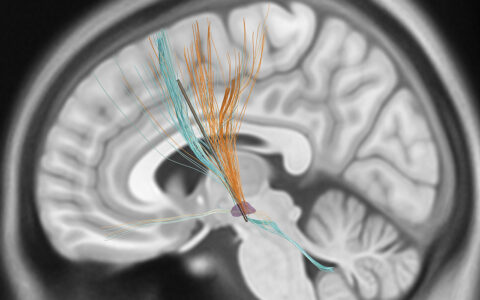Rates of cerebrovascular disease (CVD) are elevated in patients with functional seizures, and they are also liable to develop to an additional functional neurological disorder, according to new research published in Epilepsy and Behavior. “This is a novel finding, that if you have one functional neurological disorder – functional seizures – you are more likely to have another one, specifically functional stroke,” said first author Jonah Fox, M.D., a neurologist at Vanderbilt University Medical Center.
The recent study by Fox and his colleagues confirmed findings of earlier Vanderbilt research uncovering the association between functional seizures and CVD.
“That earlier study had used billing codes to identify any association between the two conditions,” he said. “We wanted to confirm the earlier findings using a different approach, by doing a manual chart review.”
Determining whether patients with one functional disorder had elevated rates of a second similar disorder constituted a secondary goal of the recent research, Fox explained.
That association was confirmed by the research findings.
Stroke Rates Elevated in Patients with Functional Seizures
Fox and his colleagues corroborated the earlier findings of increased CVD rates in patients with functional neurological disorders by manually reviewing the charts of 189 adult patients with either functional seizures (92 people) or epileptic seizures (97 people) whose records also showed they had some form of CVD. All patients had been treated at Vanderbilt.
The team found that 59 percent of the patients with functional seizure disorders also had been diagnosed with CVD. “Stroke was confirmed in 43 percent of the 92 functional-seizure patients originally identified by CVD billing codes,” the authors wrote. “This confirmed the previously reported association between functional seizures and CVD, as well as stroke.”
“Stroke and CVD proved to be more common in functional-seizure patients as compared to controls, although they didn’t occur as often as they do in patients with epileptic seizures,” Fox said. The researchers found that 88 percent of the patients with epileptic seizures identified by CVD billing codes had had CVD.
The Role of Stress
Looking at the order in which the CVD and functional seizures occurred in patients, it appeared that in half the patients, the functional seizures occurred first. Chronic stress and traumatic experiences, the authors noted, are increasingly being demonstrated through research to increase a person’s risk for CVD. These factors are also associated with functional neurological disorders.
In particular, Fox noted that childhood traumas, such as sexual or physical abuse, are risk factors for the development of functional disorders in later life. Patients with functional seizures, compared to epileptic seizures, were more likely to be young and female.
“Functional seizures have been shown to be more common in females, who are also more likely to have comorbid psychiatric diseases and also a history of trauma,” he said.
“The chronic stress of living with functional seizures and the psychiatric comorbidities that often accompany these seizures may explain the association between functional seizures and CVD,” Fox said.
Functional seizures – also known as psychogenic nonepileptic seizures or conversion disorders – represent an understudied corner of medicine where neurology and psychiatry overlap, Fox explained.
Need for Empathetic Communication
“The diagnosis of functional seizure is the second most common one made in the epilepsy monitoring unit, and patients generally handle it well,” he said, emphasizing the need for clinicians to explain it in relatable, clear and empathetic terms.
In earlier work, Fox has pioneered a method to facilitate automated screenings for depression among patients with epilepsy.
Psychological Care Proves Valuable
Left untreated, functional neurological disorders can seriously degrade quality of life and are associated with increased mortality risk, Fox said. At Vanderbilt, clinicians who diagnose a patient with a functional neurological disorder in the epilepsy monitoring unit generally refer that patient for a psychiatric appointment prior to discharge, direct them toward psychological resources in the community, and provide information about the diagnosis. Psychological interventions, specifically cognitive behavioral therapy, have proven effective.
“We may also refer them to our new clinic that’s been developed specifically to treat patients with functional seizures,” he says, adding that Vanderbilt’s psychogenic non-epileptic seizure clinic opened quite recently. “Only a few academic medical centers in the United States have this kind of clinic; they’re not common.”





